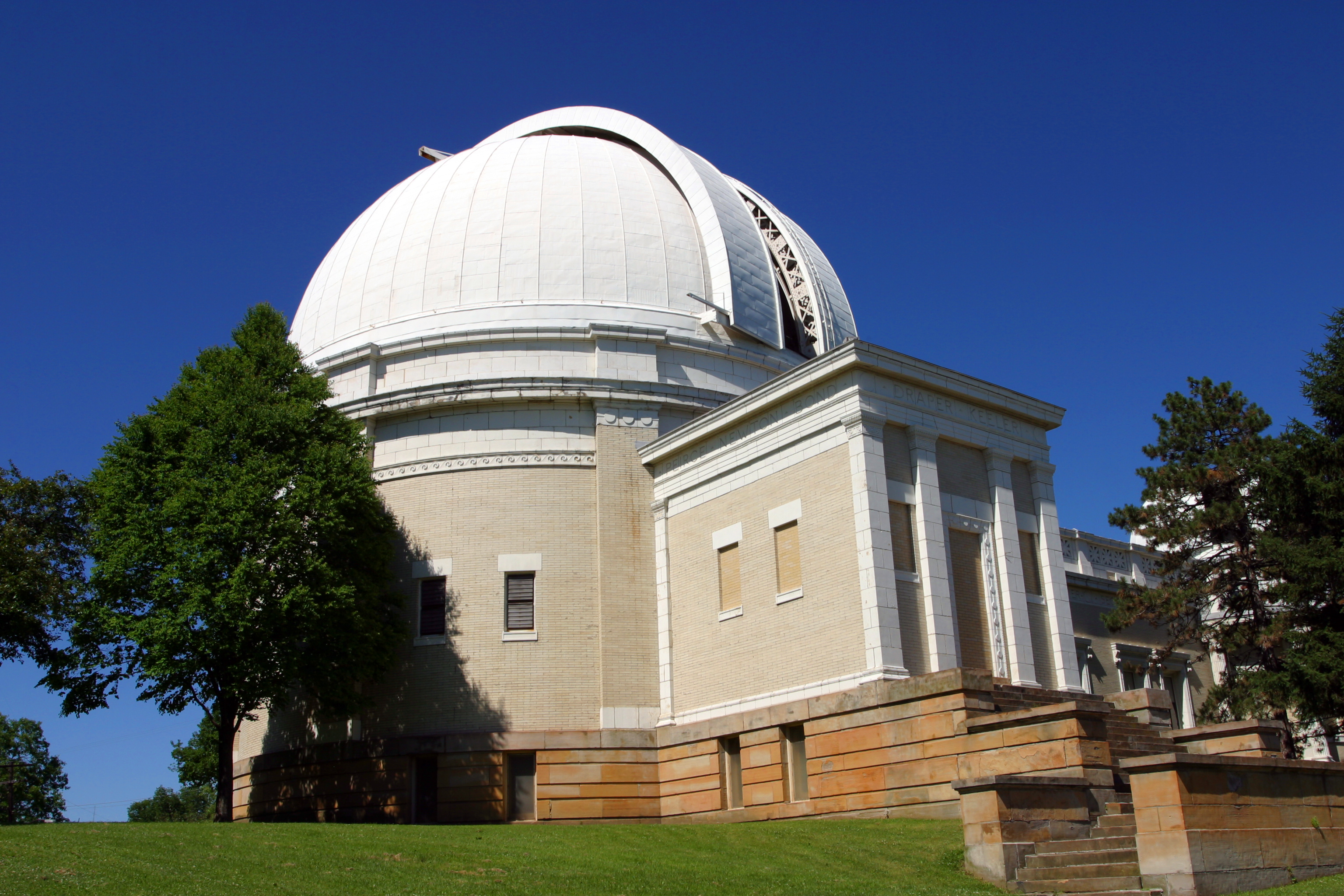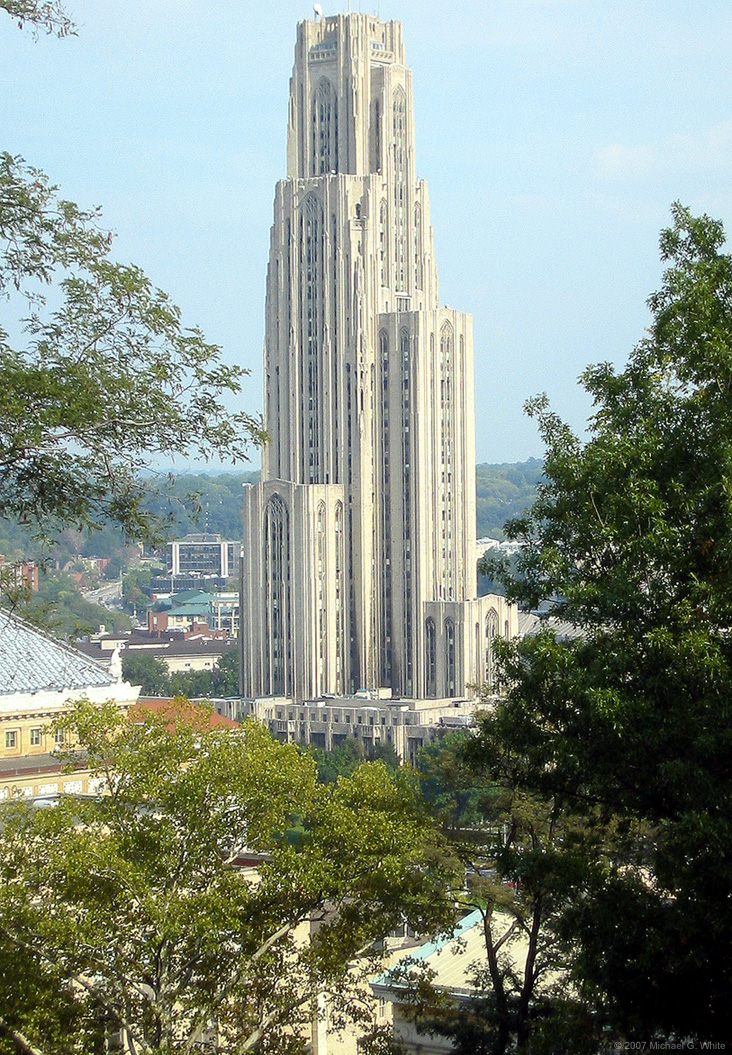|
Ruskin Hall
Ruskin Hall is a residence hall at the University of Pittsburgh and a contributing property to the Schenley Farms National Historic District. Constructed in 1921–22 by H. L. Stevens & Company, with an annex added in 1925–26, it is an eight-story building which is located between the Music Building and Information Sciences Building between Ruskin and Bellefield Avenues near Fifth Avenue on Pitt's main campus in the Oakland neighborhood of Pittsburgh, Pennsylvania. Ruskin Hall recently underwent a $19.4 million conversion and renovation from medical student housing into undergraduate apartment-style housing that opened in 2008. History Originally built in 1921–22 by H. L. Stevens & Company as the Ruskin Apartments, an annex facing Bellefield Avenue was added in 1925–26. The building has long seen usage by Pitt students, including use as the meeting place of the Omega Delta fraternity until the fall of 192 Pitt purchased the Ruskin Apartments in February 1958 for $2.24 ... [...More Info...] [...Related Items...] OR: [Wikipedia] [Google] [Baidu] |
University Of Pittsburgh
The University of Pittsburgh (Pitt) is a public state-related research university in Pittsburgh, Pennsylvania. The university is composed of 17 undergraduate and graduate schools and colleges at its urban Pittsburgh campus, home to the university's central administration and around 28,000 undergraduate and graduate students. The 132-acre Pittsburgh campus includes various historic buildings that are part of the Schenley Farms Historic District, most notably its 42-story Gothic revival centerpiece, the Cathedral of Learning. Pitt is a member of the Association of American Universities and is classified among "R1: Doctoral Universities – Very high research activity". It is the second-largest non-government employer in the Pittsburgh metropolitan area. Pitt traces its roots to the Pittsburgh Academy founded by Hugh Henry Brackenridge in 1787. While the city was still on the edge of the American frontier at the time, Pittsburgh's rapid growth meant that a proper university ... [...More Info...] [...Related Items...] OR: [Wikipedia] [Google] [Baidu] |
University Of Pittsburgh Press
The University of Pittsburgh Press is a scholarly publishing house and a major American university press, part of the University of Pittsburgh. The university and the press are located in Pittsburgh, Pennsylvania, in the United States. The press publishes several series in the humanities and social sciences, including Illuminations—Cultural Formations of the Americas; Pitt Latin American Series; Pitt Series in Russian and East European Studies, Pittsburgh Series in Composition, Literary, and Culture; Pittsburgh/Konstanz Series in Philosophy and History of Science; Culture, Politics, and the Built Environment; Central Eurasia in Context, and Latinx and Latin American Profiles. The press is especially known for literary publishing, particularly its Pitt Poetry Series, the Agnes Lynch Starrett Poetry Prize, and the Drue Heinz Literature Prize. The press also publishes the winner of the annual Donald Hall Prize, awarded by the Association of Writers & Writing Programs and the wi ... [...More Info...] [...Related Items...] OR: [Wikipedia] [Google] [Baidu] |
Historic District Contributing Properties In Pennsylvania
History (derived ) is the systematic study and the documentation of the human activity. The time period of event before the invention of writing systems is considered prehistory. "History" is an umbrella term comprising past events as well as the memory, discovery, collection, organization, presentation, and interpretation of these events. Historians seek knowledge of the past using historical sources such as written documents, oral accounts, art and material artifacts, and ecological markers. History is not complete and still has debatable mysteries. History is also an academic discipline which uses narrative to describe, examine, question, and analyze past events, and investigate their patterns of cause and effect. Historians often debate which narrative best explains an event, as well as the significance of different causes and effects. Historians also debate the nature of history as an end in itself, as well as its usefulness to give perspective on the problems of the ... [...More Info...] [...Related Items...] OR: [Wikipedia] [Google] [Baidu] |
University And College Dormitories In The United States
A university () is an institution of higher (or tertiary) education and research which awards academic degrees in several academic disciplines. ''University'' is derived from the Latin phrase ''universitas magistrorum et scholarium'', which roughly means "community of teachers and scholars". Universities typically offer both undergraduate and postgraduate programs. The first universities in Europe were established by Catholic Church monks. The University of Bologna (), Italy, which was founded in 1088, is the first university in the sense of: *being a high degree-awarding institute. *using the word ''universitas'' (which was coined at its foundation). *having independence from the ecclesiastic schools and issuing secular as well as non-secular degrees (with teaching conducted by both clergy and non-clergy): grammar, rhetoric, logic, theology, canon law, notarial law.Hunt Janin: "The university in medieval life, 1179–1499", McFarland, 2008, , p. 55f.de Ridder-Symoens, Hilde' ... [...More Info...] [...Related Items...] OR: [Wikipedia] [Google] [Baidu] |
University Club (University Of Pittsburgh)
The University Club is an eight-story building of the University of Pittsburgh designed by Henry Hornbostel and completed in 1923 that is a contributing property to the Schenley Farms Historic District on the school's campus in Pittsburgh, Pennsylvania, United States. It serves as a faculty club with publicly accessible dining, banquet, and conference facilities, while the upper four floors serve as housing for the families of out-of-town hospital patients. History The building was originally home to the "University Club," a private social club established in 1890. Initially located in downtown Pittsburgh, the club was chartered to bring together college graduates who enjoyed literature, art, and other culture. It later moved to Oakland to be closer to the city's college campuses, settling into the 1923 classical-style limestone building designed by architect Henry Hornbostel. An addition to the building was constructed in 1963. After the club ceased operations in November 2004, t ... [...More Info...] [...Related Items...] OR: [Wikipedia] [Google] [Baidu] |
List Of University Of Pittsburgh Buildings
The lists of University of Pittsburgh (Pitt) and University of Pittsburgh Medical Center (UPMC) buildings catalog only the currently-existing Pitt- and UPMC-owned buildings and structures that reside within the City of Pittsburgh, Pennsylvania, the home of the university's and medical center's main campuses. Although the University and the closely affiliated University of Pittsburgh Medical Center (UPMC) are tightly intertwined both institutionally and geographically, including the sharing and leasing arrangements of resources and facilities (such as Forbes Tower, Thomas Detre Hall, the Carrillo Street Steam Plant, Hillman Cancer Center, etc.), buildings primarily owned by UPMC are listed separately because the University and UPMC are technically separate legal entities. University of Pittsburgh The major concentration of buildings that comprise Pitt's main campus is centered in the Oakland neighborhood of Pittsburgh, however a few facilities are scattered elsewhere through ... [...More Info...] [...Related Items...] OR: [Wikipedia] [Google] [Baidu] |
Eberly Hall
{{surname, Eberly ...
Eberly is a surname. Notable people with the surname include: *Angelina Eberly (1798–1860) *Bob Eberly (1916–1981), American singer *Don Eberly (born 1953), American writer *George A. Eberly (1871–1958), Justice of the Nebraska Supreme Court *Janice Eberly (born c. 1964), American economist *Joseph H. Eberly (born 1935), American physicist *Lynn Eberly (fl. 1990s–2010s), American statistician * Robert E. Eberly (1918–2004), American chief executive See also *Eberle *Everly (other) Everly may refer to: People * Don and Phil Everly, singers known as The Everly Brothers * Jack Everly, American conductor and music arranger Places * Everly, Iowa, United States * Everly, Seine-et-Marne, France Other uses * ''Everly'' (film ... [...More Info...] [...Related Items...] OR: [Wikipedia] [Google] [Baidu] |
Contributing Property
In the law regulating historic districts in the United States, a contributing property or contributing resource is any building, object, or structure which adds to the historical integrity or architectural qualities that make the historic district significant. Government agencies, at the state, national, and local level in the United States, have differing definitions of what constitutes a contributing property but there are common characteristics. Local laws often regulate the changes that can be made to contributing structures within designated historic districts. The first local ordinances dealing with the alteration of buildings within historic districts was passed in Charleston, South Carolina in 1931. Properties within a historic district fall into one of two types of property: contributing and non-contributing. A contributing property, such as a 19th-century mansion, helps make a historic district historic, while a non-contributing property, such as a modern medical clinic, ... [...More Info...] [...Related Items...] OR: [Wikipedia] [Google] [Baidu] |
Darragh Street Medical Student Housing
The upper campus residence halls at the University of Pittsburgh include Sutherland Hall, Panther Hall, K. Leroy Irvis Hall, the fraternity housing complex, and the Darragh Street Apartments. Among the newest residence facilities at the university, these buildings reside on the upper campus located near many of the school's athletic facilities. The upper campus resides approximately above the lower campus that lies along Forbes and Fifth Avenues, providing dramatic views along the hilltop and slopes. Planning for upper campus student housing originated in the late 1960s and early 1970s, but stalled due to community and political opposition until the early 1990s with opening of Sutherland Hall, the first major student residence constructed by Pitt in 29 years. Sutherland Hall Sutherland Hall is a residence hall of the University of Pittsburgh and is located on the upper campus next to the major athletic facilities and the Petersen Events Center. The $24 million ($ in dollars) ... [...More Info...] [...Related Items...] OR: [Wikipedia] [Google] [Baidu] |
Richard King Mellon
Richard King Mellon (June 19, 1899 – June 3, 1970), commonly known as R.K., was an American financier, general, and philanthropist from Ligonier, Pennsylvania, and part of the Mellon family. Biography The son of Richard B. Mellon, nephew of Andrew W. Mellon, and grandson of Thomas Mellon, he and his sister Sarah Mellon Scaife and cousins Paul Mellon and Ailsa Mellon-Bruce, were heirs to the Mellon fortune, which included major holdings in Mellon Bank, Gulf Oil, and Alcoa. In 1957, when '' Fortune'' prepared its first list of the wealthiest Americans, it estimated that the four cousins were all amongst the richest eight people in the United States, with fortunes of between $400 million and $700 million dollars each. R.K. Mellon served as president and chairman of Mellon Bank. He also served on the board of trustees of the University of Pittsburgh over a span of several decades and was a major benefactor to the university. Military service Mellon served in the United Stat ... [...More Info...] [...Related Items...] OR: [Wikipedia] [Google] [Baidu] |



.jpg)


